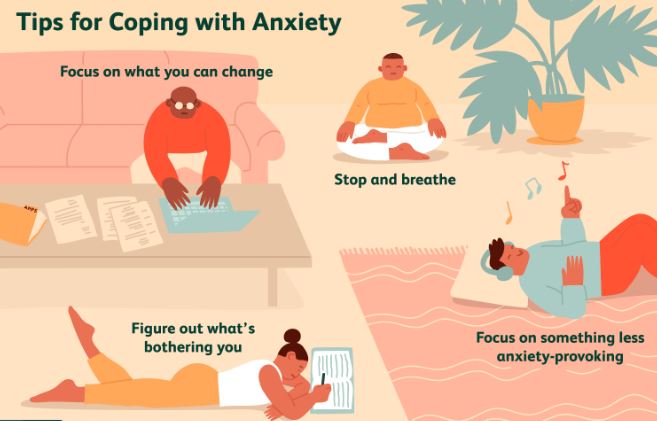Managing anxiety can be challenging, but with the right techniques and strategies, you can gain control and improve your well-being. Here are some effective techniques and tips for managing anxiety:
How to Manage Anxiety: Techniques and Tips
- Practice Mindfulness and Meditation
– Mindfulness: Focus on the present moment without judgment. Techniques include mindful breathing, observing your surroundings, and practicing gratitude.
– Meditation: Consider guided meditation sessions available through apps or online resources. Regular practice can help calm your mind and reduce anxious thoughts.
- Engage in Regular Exercise
Physical activity can significantly reduce anxiety levels:
– Aerobic Exercise: Activities like walking, running, biking, or dancing can boost endorphins, improve mood, and reduce stress.
– Yoga: Combines physical movement with breath control and meditation, promoting relaxation and reducing tension.
- Establish a Routine
Creating a structured daily routine can provide a sense of control and predictability in your life:
– Plan your day with set wake-up and sleep times.
– Include designated times for work, exercise, relaxation, and socialization.
- Limit Caffeine and Alcohol
Both caffeine and alcohol can exacerbate anxiety symptoms:
– Caffeine: It can lead to increased heart rate and nervousness. Consider reducing or eliminating caffeinated beverages.
– Alcohol: While it may temporarily seem to relieve anxiety, alcohol can worsen anxiety over time and impact sleep quality.
- Prioritize Sleep Hygiene
Quality sleep is essential for mental well-being:
– Create a calming bedtime routine (reading, warm baths, meditation).
– Maintain a consistent sleep schedule by going to bed and waking up at the same time each day.
– Ensure your sleep environment is comfortable and conducive to rest (dark, quiet, and cool).
- Connect with Others
Social support can help alleviate anxiety:
– Talk to friends or family about your feelings. Sharing your concerns can provide relief and perspective.
– Consider joining support groups or connecting with others who understand what you’re going through.
- Practice Deep Breathing Techniques
Deep breathing can activate your body’s relaxation response:
– Try the 4-7-8 technique: Inhale through your nose for 4 counts, hold the breath for 7 counts, and exhale slowly through your mouth for 8 counts. Repeat several times.
- Challenge Negative Thoughts
Cognitive Behavioral Therapy (CBT) techniques can help in reframing negative thought patterns:
– Keep a journal to track anxiety triggers and associated thoughts.
– Identify cognitive distortions (e.g., catastrophizing, black-and-white thinking) and consciously reframe these thoughts into positive or realistic ones.
- Limit Screen Time and News Exposure
Continuous exposure to screens and news can heighten anxiety:
– Set limits on social media and news consumption, particularly if certain platforms or topics lead to increased stress.
– Schedule specific times to check news and stick to those times.
- Engage in Hobbies and Activities
Participating in activities you enjoy can distract you from anxious thoughts and bring joy:
– Explore interests like reading, painting, gardening, or puzzles.
– Get creative with arts, crafts, or any form of expression that resonates with you.
- Seek Professional Help
If anxiety becomes overwhelming or persistent:
– Consult a mental health professional for therapy options like CBT, which can provide a structured approach to managing anxiety.
– Discuss medication options with a healthcare provider if appropriate.
- Learn Relaxation Techniques
Incorporate relaxation techniques to manage stress:
– Progressive Muscle Relaxation: Tense and then relax each muscle group, starting from your toes to your head.
– Visualization: Imagine a peaceful scene or a place where you feel safe and relaxed.
Conclusion
Managing anxiety is a personal journey and may require a combination of techniques to find what works best for you. Practicing self-care, reaching out for support, and maintaining a proactive approach can help you navigate anxiety more effectively. Remember that it’s okay to seek help and prioritize your mental well-being.

